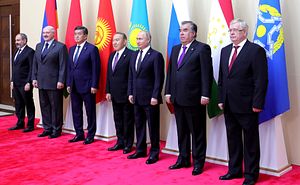Turmoil in the Collective Security Treaty Organization (CSTO) has led to the postponement of an important gathering of the heads of the member states at which a decision was supposed to be made regarding the group’s secretary general.
The military alliance led by Russia and including Armenia, Belarus, Kazakhstan, Kyrgyzstan, and Tajikistan as full members, has been posited as an answer in the post-Soviet space to the North Atlantic Treaty Organization (NATO). But the CSTO has never had the unity of purpose seen in NATO’s joint efforts, such as in Afghanistan, and has been plagued by internal discord among members.
The current turbulence was triggered by Armenia’s decision in early November to recall Yuri Khachaturov, a former chief of the General Staff of the Armenian Armed Forces, who had been serving as the CSTO secretary general. Khachaturov had been charged in July 2018 with involvement in the violent crackdown that followed Armenia’s disputed March 2008 presidential election.
Armenia currently holds the CSTO’s rotating presidency. The question of how and who will be chosen to serve as the organization’s formal head has been in dispute.
As Eduard Abrahamyan outlined in an article for the Jamestown Foundation, Armenia insisted that it be allowed to choose a replacement to finish out Khachaturov’s term, which runs to 2020. After the November 8 meeting of the CSTO in Astana, however, Kazakhstan and Belarus insisted that the group’s charter, in which the rotational leadership principal is enshrined, should allow Belarus to chose the next head. Belarus follows Armenia for leadership of the CSTO.
Belarusian President Alexander Lukashenko reportedly let slip details of the CSTO’s closed-door discussions to the Azerbaijani ambassador in Minsk, prompting a predictably angry retort from Armenia. Armenia’s interim Prime Minister Nikol Pashinyan said he “will demand clarifications [from Lukashenko] concerning the discussion of internal CSTO affairs with Azerbaijan.”
Azerbaijan is not a member of the CSTO. Although neighboring states, Armenia and Azerbaijan don’t have diplomatic relations, largely stemming from the Nagorno-Karabakh dispute. Meanwhile, Azerbaijan has functioning relations with other CSTO members — especially fellow Caspian littoral states Russia and Kazakhstan.
The secretary general question was supposed to be ironed out at a meeting of the CSTO leaders in St. Petersburg on December 6. But on December 4, Russian presidential aide Yury Ushakov said the meeting would be postponed into 2019 at Armenia’s request. Armenia is holding snap elections on December 9.
Armenian authorities, however, quickly pushed back. Arman Yeghoyan, a spokesman for acting Prime Minister Pashinian, said Armenia had not requested a postponement. Instead, Yeghoyan said Russian President Vladimir Putin had proposed the delay.
Beyond the he-said, he-said, this episode exposes the internal fault lines that undercut the CSTO’s heft on the global stage.
Returning to Abrahamyan:
Moscow, with its regional military infrastructure and post-colonial attitudes, is the only factor uniting the alliance’s member states, which all have contrasting interests and values. As an institutional vehicle for legitimizing Russia’s self-declared zone of privileged influence over the post-Soviet space, the CSTO lacks both common values and a shared strategic vision to unite its members as well as ensure internal cohesion.
While the writing seems to be on the wall, diplomatic engagement continues. On the sidelines of the OSCE Ministerial Council in Milan, the CSTO foreign ministers met and reportedly discussed the general secretary issue. Meanwhile, in St. Petersburg the heads of the Commonwealth of Independent States (CIS) did meet — including all those also in the CSTO. One can never have too many regional groupings.

































